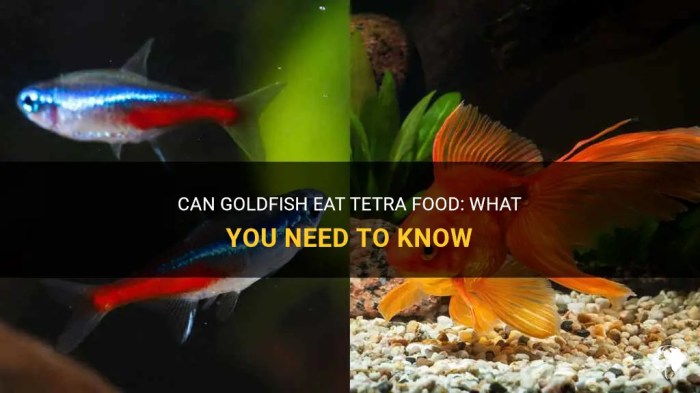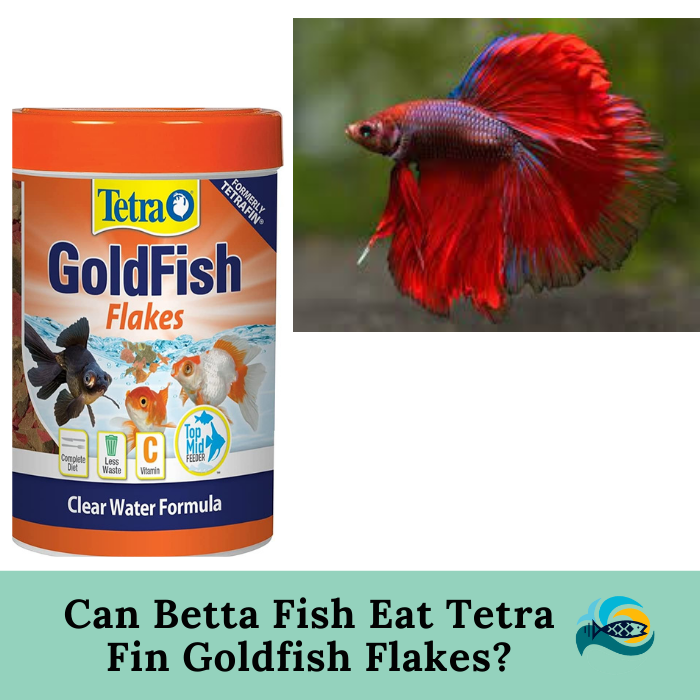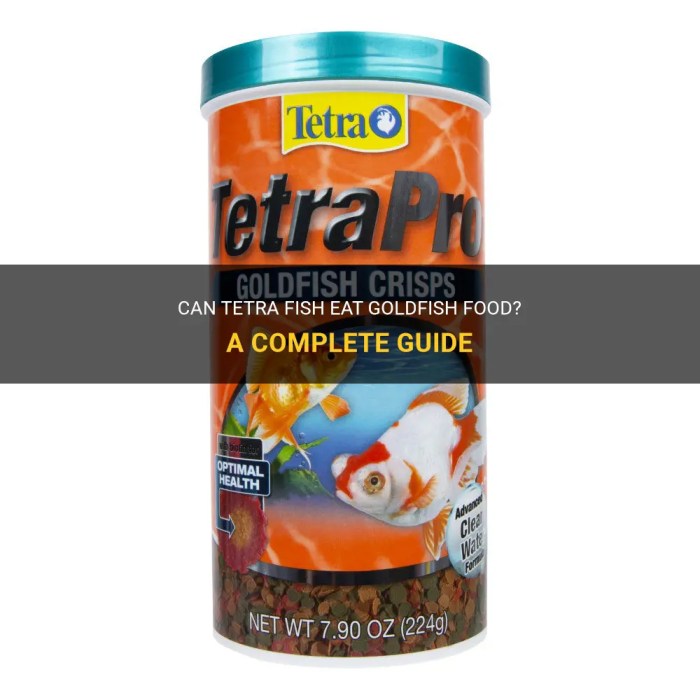Can goldfish eat tetra food? The answer, while seemingly simple, delves into the intricate world of goldfish nutrition. Goldfish, with their vibrant colors and graceful movements, are beloved aquarium inhabitants, but their dietary needs often pose a challenge to even the most experienced aquarists.
Tetra food, a popular choice for fish owners, is often marketed as a complete and balanced diet. However, the question remains: is it truly suitable for goldfish?
This article examines the nutritional content of tetra food, comparing it to the specific dietary requirements of goldfish. We explore the potential benefits and risks associated with feeding tetra food to goldfish, providing insights into its suitability as a primary food source.
Additionally, we present a comprehensive guide to alternative food options, ensuring your goldfish receive the optimal nourishment for a healthy and vibrant life.
Goldfish Diet Basics: Can Goldfish Eat Tetra Food

Goldfish, with their vibrant colors and graceful movements, are popular aquarium inhabitants. However, providing them with the proper nutrition is crucial for their health and longevity. Understanding their dietary needs and providing a balanced diet can ensure your goldfish thrive in their aquatic environment.
While goldfish can technically eat tetra food, it’s not their ideal diet. Their digestive systems are better suited for smaller, more digestible food like flakes or pellets specifically formulated for goldfish. It’s important to note that goldfish are omnivores, and while they can eat other fish, they’re not necessarily predators.
Can goldfish eat other fish ? The answer is yes, but only if the fish is already dead and small enough to be consumed. Sticking to their preferred diet is the best way to ensure their health and longevity.
Nutritional Needs of Goldfish
Goldfish, like all living organisms, require a balanced diet to obtain the essential nutrients for optimal growth, development, and overall health. These nutrients include:
- Protein:Protein is vital for muscle growth and repair, as well as the production of enzymes and hormones. Goldfish, being omnivores, obtain protein from various sources, including insects, algae, and other aquatic organisms.
- Carbohydrates:Carbohydrates provide energy for goldfish to swim, grow, and perform other bodily functions. They derive carbohydrates from plant matter, such as algae and aquatic plants.
- Fats:Fats are important for energy storage and insulation, as well as the absorption of certain vitamins. Goldfish obtain fats from various sources, including fish oils, crustaceans, and other aquatic organisms.
- Vitamins:Vitamins play a crucial role in various bodily functions, including immune system support, growth, and vision. Goldfish obtain vitamins from a diverse range of food sources, including algae, aquatic plants, and commercially prepared foods.
- Minerals:Minerals are essential for bone development, muscle function, and other bodily processes. Goldfish acquire minerals from algae, aquatic plants, and other sources.
Importance of a Balanced Diet for Goldfish
Providing a balanced diet for goldfish is essential for their overall well-being. A balanced diet ensures they receive the necessary nutrients in the correct proportions to support their growth, development, and health.
A balanced diet can prevent nutritional deficiencies, which can lead to various health problems, including stunted growth, weakened immune systems, and increased susceptibility to diseases.
While goldfish can generally eat tetra food, it’s not their ideal diet. Tetra food is often higher in protein and fat than goldfish require, which can lead to health issues. You might wonder if betta food is a better option, and you can find out more about that here: can goldfish eat betta food.
Ultimately, a balanced diet of high-quality goldfish flakes, pellets, and occasional treats like blanched vegetables is the best way to keep your goldfish healthy and happy.
Common Goldfish Food Options
There are various food options available for goldfish, each offering different nutritional profiles.
While goldfish can enjoy a variety of foods, including commercial tetra flakes, it’s important to remember that their digestive systems are delicate. Just as you wouldn’t feed them bread, which is a staple in the human diet but can be harmful to fish, can goldfish eat bread , it’s also crucial to avoid overfeeding and ensure they receive a balanced diet.
This will help maintain their health and prevent digestive issues.
- Flakes:Flakes are a common and convenient food option for goldfish. They are readily available, easy to store, and can be easily dispensed. Flakes typically contain a mix of ingredients, including protein, carbohydrates, fats, vitamins, and minerals.
- Pellets:Pellets are another popular food option for goldfish. They are often more dense and nutrient-rich than flakes. Pellets are available in various sizes and formulas, catering to different goldfish species and sizes.
- Live Foods:Live foods, such as brine shrimp, bloodworms, and daphnia, can be a valuable addition to a goldfish’s diet. They provide a natural source of protein, fats, and other essential nutrients.
- Frozen Foods:Frozen foods, like brine shrimp, bloodworms, and daphnia, offer a convenient alternative to live foods. They are typically preserved in a frozen state, maintaining their nutritional value.
- Fresh Foods:Fresh foods, such as blanched spinach, zucchini, and peas, can be offered to goldfish as a supplement to their regular diet. These foods provide additional fiber and vitamins.
Tetra Food Composition

Tetra food is a popular choice for goldfish owners, but understanding its composition is crucial to ensuring your pet receives a balanced diet. Tetra food, like most commercial fish foods, is a blend of ingredients designed to provide essential nutrients for fish growth and health.
Ingredients in Tetra Food, Can goldfish eat tetra food
The specific ingredients in Tetra food can vary depending on the type of food, but some common components include:
- Fish meal:A primary source of protein, fish meal is derived from ground-up fish and is rich in amino acids essential for goldfish growth.
- Wheat flour:A carbohydrate source, wheat flour provides energy for goldfish activity.
- Soybean meal:Another protein source, soybean meal can also contribute to the overall nutritional value of tetra food.
- Other grains:Corn, rice, and barley are often included in tetra food as carbohydrate sources, contributing to energy levels.
- Vitamins and minerals:Tetra food typically includes added vitamins and minerals, such as vitamin C, vitamin E, and calcium, to support goldfish health and well-being.
- Coloring agents:These can be added to enhance the visual appeal of the food.
- Preservatives:Preservatives are added to extend the shelf life of the food.
Nutritional Content of Tetra Food
The nutritional content of tetra food can vary based on the specific formula. However, a typical tetra food might contain:
- Protein:Around 30-40%, which is generally considered adequate for goldfish.
- Fat:Approximately 5-10%, which is within the recommended range for goldfish.
- Fiber:2-5%, which can aid in digestion and gut health.
Comparing Tetra Food to Goldfish Needs
While tetra food can provide some essential nutrients for goldfish, it’s important to consider the following:
- Variety:Goldfish benefit from a varied diet that includes both commercial food and live or frozen foods, such as brine shrimp, bloodworms, and daphnia. This helps ensure they receive a broader range of nutrients.
- Overfeeding:Tetra food is often high in protein and fat, which can lead to obesity and health problems if overfed.
- Nutrient deficiencies:Some tetra foods may not contain adequate levels of certain nutrients, such as omega-3 fatty acids, which are crucial for healthy skin and scales.
Closure

Understanding the nutritional needs of goldfish is crucial for their well-being. While tetra food can be a part of a balanced diet, it’s essential to consider its limitations and explore alternative food sources. By providing a diverse and nutritious diet, you can ensure your goldfish thrive in their aquatic environment.
Remember, a healthy goldfish is a happy goldfish!